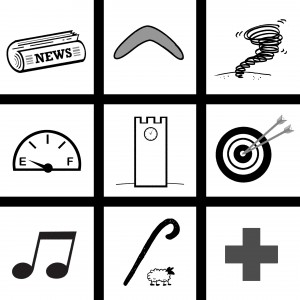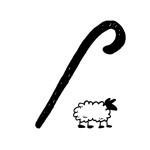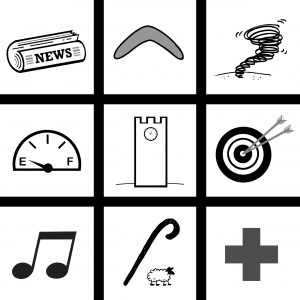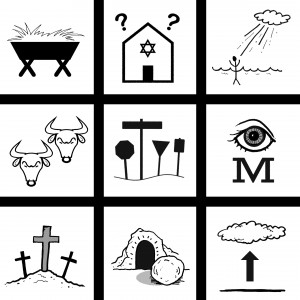 History records the brilliance of God’s ability to weave good out of this “evil time” in history. The evil nations that He allowed to spring up would set the stage for his coming Messiah. The Greeks would expand the known world and established a common language, making the message of the God’s forgiveness easy to communicate. The Romans would establish the Pax Romana, the Roman Peace. Their roads, security, and “peace” for travel would make the communication of God’s message easy to spread quickly throughout the world. Bottom line: God allowed the Greeks to do the communication plan, the Romans to set up the infrastructure, and the early church to spread the message. God was planning centuries in advance for our Forgiver’s arrival. We learn from Habakkuk that it’s okay to struggle and doubt with God. We can share our honest questions with God. We also learn that God has plans that are too big for our little brains to understand. We must choose to cling rather than curse, knowing His wisdom is greater than ours.
History records the brilliance of God’s ability to weave good out of this “evil time” in history. The evil nations that He allowed to spring up would set the stage for his coming Messiah. The Greeks would expand the known world and established a common language, making the message of the God’s forgiveness easy to communicate. The Romans would establish the Pax Romana, the Roman Peace. Their roads, security, and “peace” for travel would make the communication of God’s message easy to spread quickly throughout the world. Bottom line: God allowed the Greeks to do the communication plan, the Romans to set up the infrastructure, and the early church to spread the message. God was planning centuries in advance for our Forgiver’s arrival. We learn from Habakkuk that it’s okay to struggle and doubt with God. We can share our honest questions with God. We also learn that God has plans that are too big for our little brains to understand. We must choose to cling rather than curse, knowing His wisdom is greater than ours.
The prophet Jeremiah picked up a similar chorus in the book of Lamentations. He got to see the aftermath of the evil Babylonian’s rampage on God’s people. Though Jeremiah had predicted the fall of Jerusalem to the Babylonians, he never imagined the carnage in 586 B.C. Jeremiah was known as the weeping prophet, and led a life and ministry characterized by loneliness and rejection. He knew God would remove His hand of protection from Judah, who continued to trust other gods to protect them, but his heart broke for his people too. The book of Lamentations is a personal journal of poems, reflections, and doubts. The author asks, why does God allow pain into His children’s lives?
Jeremiah lamented that he felt like he had been shot by God. He felt like God had a quiver and had “targeted his

people” with pain and devastation. He felt like God had become his enemy. He felt like he had no hope, no comfort, no future, and no God on his side. Jeremiah launched into an explosion of pain and doubt paragraph after paragraph. The surprising reality of the book of Lamentations is this: Jeremiah was clinging to God through his crying. His honest reflection and weeping were holy acts. His words became a book of the Bible to remind us to cling while we cry. In the middle of the book, Jeremiah shared with us the secret to his tension. He “recalls this to mind and therefore has hope. God’s mercies are new every morning. Great is His faithfulness.” Jeremiah remembered that God is faithful – even when His people are faithless. Jeremiah remembers that God is a master of turning pain into joy, mourning into dancing. Jeremiah reminded the people that their season of bondage would only last seventy years and then God would restore His promises. God promised to finish the good work He began in them, and again called His people to return for forgiveness and leadership. God wanted them to cling in their cries. He wanted them to give Him their tears in the coming years. God keeps His promise to His people: the Babylonian exile ended after seventy years – exactly as He said it would.

The book of Psalms is a music book. It’s a book of songs, hymns and poems sung by God’s people over the years. Many of them are celebratory songs of God’s strength, comfort, power, might, and wisdom. The book is also filled with lament Psalms of pain and anguish recording the painful cries of God’s people under duress. The book of Psalms reminds us to cry out to God in times of need. One writer, Asaph, in Psalm 73, wrote about how he almost slipped in his faith when he saw evil prospering. He struggled intellectually with the problem of evil. He imagined that evil people had “no pains in their death.” He saw good poured out onto the evil people while good people suffered. Asaph had to remind himself that God will be the final judge. He will reward those who trust in Him. God will bring final consequences onto evil doers. The hope and promise of a just, righteous God allowed Asaph to cling to God during his confusion.
One of the most famous psalms is Psalm 23. It is a reminder that God is with when we are down. We can cling to Him during a crisis because He will never leave us or forsake us. We serve a God who walks with us during the dark times, like a good shepherd who leads us to greener pastures. This Psalm was written by David during his difficult times:
Psalm 23 1 The Lord is my shepherd; I shall not want. 2 He makes me to lie down in green pastures; He leads me beside the still waters. 3 He restores my soul; He leads me in the paths of righteousness for His name’s sake. 4 Yea, though I walk through the valley of the shadow of death, I will fear no evil; For You are with me; Your rod and Your staff, they comfort me. 5 You prepare a table before me in the presence of my enemies; You anoint my head with oil; My cup runs over. 6Surely goodness and mercy shall follow me all the days of my life; And I will dwell in the house of the Lord Forever.

The last type of Psalm is the Messianic Psalm. These Psalms help us answer the problem of evil by looking to the Messiah, God’s final forgiver and rescuer. The God of the Bible doesn’t stay up in heaven looking down on mankind from a distance. The Psalms tell us that God will come close. He will enter into our pain. The Messiah will be the God who can sympathize, a man acquainted with grief and sorrow. The Messiah will cry out the words, “My God, My God, why have You forsaken Me?” The Messiah will enter the crisis of an evil world through pain and suffering and experience grief, betrayal, pain, and crucifixion. This coming Messiah will show us how to cling to our Father during crisis. He will be abandoned by God and killed for our rebellion. Everyone will think God has left Him. Everyone will think God’s plan is wrecked … but God will remain faithful. God will not “let His Holy One see decay.” He will raise the Forgiver from the Dead. God will bring salvation from destruction and hope from despair. The faithfulness of the One who clings to God when the whole world is falling apart will make a way for the faithless to be made whole again. The Messiah will experience the pain of a “red cross,” healing us through his suffering.
This section of the Bible is about tears, fears and doubts. These books – Ruth, Job, Lamentations, Psalms, and Habakkuk – are great places to pour out your heart to God. They remind us of a constant theme from the Scriptures: we can cling or curse God when we enter a crisis. We can cling to God who knows more than we do, who enters into our pain, and who promises never to leave us alone.
Here is a live teaching of Fast Track (Job, Ruth, Lamentations, Psalms):
For a free session of Godonomics, visit: http://www.godonomics.com/watch-session-5


